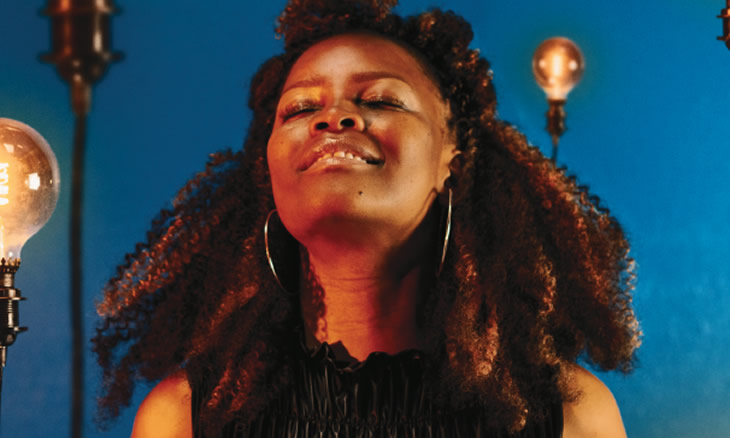Two Mozambican authors among 10 in Oceanos Prize ‘transcontinental’ shortlist
Back home in Mozambique for ‘huge musical hug’ – Selma Uamusse

File photo: O País
Selma Uamusse returns to Mozambique for a special concert this Saturday (Europe Day) at the Franco-Mozambican Cultural Centre.
Born in Mozambique and based in Portugal, Uamusse, who merges her musical and lexical roots with tonalities of electronica, jazz, soul-funk and Afrobeat, will recap her most memorable themes of her Mati (2018) an Livoning (2020) collections, such as “Ngono Utane Vuna Kud ima” and “Hoyo Hoyo”.
In the emotion which characterizes any return home, Selma Uamusse promises a tribute concert to the country that continues to inspire her artistic creation and her work as a social activist.
This is what Uamusse wrote on her Instagram page about next Saturday’s concert.
“The first and only time I performed solo in Mozambique was in 2017, at the Mozambique Music Meeting MM Festival. We had not released records and our experience of performing on stages outside Portugal was slim. We had been pondering a reunion at the Franco-Mozambican Cultural Centre for a long time, and I am delighted with this reunion. We return with two albums in our pocket, ‘Mati’ and ‘Liwoningo’, both dedicated to Mozambique, its polyrhythmic, polyphonic riches and cultural wealth, the characteristic truths of a Mozambican woman in the diaspora, a handful of concerts in some corners of the world, but with the nervousness and the joy of someone returning home, as if I am singing here for the first time.
“As part of the ‘Africa-Europe Concert’ I join a group of incredible women of whom I am a fan and whose talented work I follow closely. They are Assa Matusse, Lenna Bahule and Pongo, and I’m bringing my super band composed of Augusto Macedo, Gonçalo Santuns, Milton Gulli, Nataniel Melo and Hugo Santos.
“Maputo, let’s go and let’s go with a lot of determination, we are counting on you for a huge musical hug.”
Bio
Selma Uamusse is a Mozambican singer born in 1981, living in Portugal since 1988. She has sung professionally since she was a teenager, crafting a very diverse musical career. Her versatility, her powerful voice and her performative genius led her to shine from rock (WrayGunn) to afrobeat (Cacique’97), through gospel Gospel Collective, (Gospel Sisters), soul and jazz (Rodrigo Leão, tributes to Nina Simone and Miriam Makeba), enriching her journey with different languages, and always aware of the transformative social and political power of music.
Selma studied at the Hot Clube of Portugal and created in her own name the projects Souldivers, Selma Uamusse Nu Jazz Ensemble and Tribute to Nina Simone, in which she collaborated with Ana Bacalhau, Rita Redshoes, Marcia, The Legendary Tigerman, Luisa Sobral, Elisa Rodrigues, the Gospel Collective, among others. Selma appeared on albums and in shows by artists such as Samuel Úria, Medeiros/Lucas, “You Can’t Win Charlie Brown”, Joana Barra Vaz, Moullinex, Orquestra Todos among others. Last year she also lent her body and voice to theatre projects (“Ruínas” staged by António Pires and “Passa-Porte” by André Amálio), cinema (“Cabaret Maxime” by Bruno Almeida and “Fogo” by Pedro Costa) and in the visual arts (installation by Angela Ferreira).
In her own name, Selma Uamusse explores the roots of her country of origin, using Mozambican rhythms and lyrics in native languages, using traditional instruments such as timbila and mbira, combining everything with electronics and other references that mirror her diverse influences.
Her debut album, “Mati“, which means “water” in Changana (one of the three most commonly spoken languages in Mozambique), published in 2018 by Ao Sul do Mundo and distributed by Sony Music, was widely praised by national critics, having been performed on prestigious national and international stages during a tour with more than 60 dates, including Rock in Rio (Portugal), Vodafone Mexefest (Portugal), FMM Sines (Portugal), Festival MED (Portugal), MiMO Amarante (Portugal), MaMA Paris (France), MMM Maputo (Mozambique), MIL Lisbon (Portugal), SIM São Paulo (Brazil), Back2black Festival Rio de Janeiro (Brazil), Siesta Festival Gdansk (Poland), Galician Art Center Contemporary Santiago de Compostela (Spain), NY SummerStage in Central Park (USA), Festival Crespo at Circo Voador (Brazil), Atlantic Festival in Philharmonie (Luxembourg) and the Akropolis Palace in Prague (Czech Republic).
If there is a musical encounter between Selma and Mozambique on her first album, there is also a spiritual encounter with the African continent. Selma Uamusse’s first album, produced by the expert hands of Jori Collignon (from Skip & Die), is heard as two simultaneous journeys – a geographic one, a visit to Mozambique, where the singer draws on sounds and shares her identity; and an interior, in a spiritual map that is discovered as the music infiltrates the listener. In each second, this long-awaited debut album by Selma produces a hypnotic effect, weaving us between past and future, belonging to the ancestor and the explorer, creating a song that has no possible name. Or maybe it does. Perhaps it is simply called Selma Uamusse.
In 2020, Selma Uamusse released her second album in her own name, “Liwoningo” (which means light in Chope, a traditional language of Mozambique). Produced by Guilherme Kastrup, a Grammy-winning producer for the albums “A Mulher do Fim do Mundo” and “Deus é Mulher” by the acclaimed and also awarded Elza Soares. This an album accentuates the intangible African heritage of Mozambique, an Africanity that continues to inspire lyrics and melodies, but that mixes around the world, in themes and arrangements, some closer to the tradition of folklore, others that wander between electronic, rock, afro-beat and experimental, always maintaining as a common place, the power of African rhythm, language or sounds, opening space for Portuguese and Brazilian influences.
- Selma Uamuse – Concerto África- Europa
- Saturday, May 13, from 6:00 p.m. at Franco-Mozambique Cultural Centre
- Tickets are on sale at CCFM from 10:00 a.m. to 7:00 p.m. at 600 meticais each
- Franco-Mozambican Cultural Centre, Av. Samora Machel 468, Maputo
See below a short glimpse at Selma Uamusse’s performance at the awarding ceremony of the Camões Prize to Mozambican writer Paulina Chiziane, last Friday (5 May) in Lisbon.












Leave a Reply
Be the First to Comment!
You must be logged in to post a comment.
You must be logged in to post a comment.